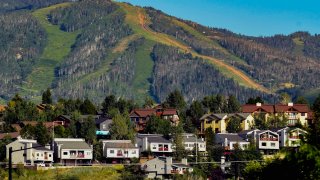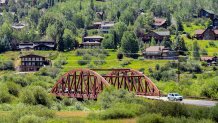
Despite offering a salary of $167,000, the city of Steamboat Springs can’t find a head of human resources who can afford a place to live in the remote Colorado community surrounded by ranches and famous for training Olympic athletes.
At the Steamboat hospital, doctors willing to pay more than $1 million for a home have been repeatedly outbid by all-cash, out-of-town buyers, and housing costs have caused some positions to go unfilled for more than two years, NBC News reported. The local ski resort has been leasing a hotel for its employees to live in as the homes they once rented are increasingly turned into short-term rentals for visitors.
“Houses used to be for employees and hotels for guests. Now houses are for guests and hotels are for employee housing,” said Loryn Duke, director of communications for the Steamboat ski resort. “We have a lot of great staff who are early in their careers or have young families, but they just aren’t able to put down those roots.”
In Steamboat, along with other mountain towns and destination communities across the country, a pandemic-fueled real estate boom driven by remote workers, second-home buyers and short-term rental investors has caused home prices to nearly double. Those prices have shown few signs of easing, despite rising interest rates and a push for remote workers to return to the office, leaving even high-income professionals struggling to find housing in small, rural communities across the country.
We've got the news you need to know to start your day. Sign up for the First & 4Most morning newsletter — delivered to your inbox daily. >Sign up here.
“I know that it’s so hard for folks outside of mountain or resort communities to even wrap their heads around, but housing is just so through the roof that unless you’re extremely wealthy, it’s unattainable,” said Margaret Bowes, executive director of the Colorado Association of Ski Towns.
But addressing the problem has created a predicament of its own, dividing residents in a battle over how to provide more housing and who should pay for it.
Local governments and state legislatures, including those in Utah and Virginia, have been at odds over restrictions on short-term rentals like Airbnbs, and ballot initiatives to add taxes to those rentals have had mixed results at the polls. When it comes to building more housing, residents have mounted opposition to some efforts over concerns about everything from traffic congestion to wildlife migration patterns.
In Steamboat, the latest battle lines have been drawn over a 534-acre ranch that the city’s housing authority purchased with a $24 million anonymous donation. Under the current proposal, the housing authority would use state and federal grants and proceeds from a recently passed tax on short-term rentals to build more than 2,200 housing units in phases. Sale and rental of the properties would be restricted to residents who meet a certain income threshold, work locally, and plan to live in the unit full-time.

“In this environment where there’s always going to be significant amounts of demand, we have to deal with it on the supply side, and our supply side just has not kept up year over year over year over year,” said Jason Peasley, director of the Yampa Valley Housing Authority, which would oversee the development.
U.S. & World
The day's top national and international news.
The project, called Brown Ranch, has been met with opposition from a group of local residents who have raised concerns about its financing and the impact on traffic and local infrastructure, along with what it could mean for the character of the community.
During a city council meeting in October that stretched into the early-morning hours, dozens of residents spoke for and against the project, with supporters pleading for affordable housing and opponents urging the city to scale back the plans or take more time to study the impact. In the end, a divided city council voted to approve the Brown Ranch plan. But opponents collected more than 1,000 signatures to get the development placed on the ballot on March 26, leaving the final decision up to voters.
Jim Engelken, who has lived in Steamboat since 1979 and previously served on the city council, has been helping organize the opposition. Engelken said he sees a need for more affordable housing but would like to see the development downsized or grow at a slower pace.
“Yes, we need affordable housing, no question,” Engelken said. “It needs to be smaller to start with, it needs to have some ability to generate its own way, its own money.”
He said he is concerned that the city won’t have enough funds for the planned infrastructure, like parks and public transit, and that the projected 6,000 people who will ultimately live at the development — the majority of whom are expected to move there from out of town — will add to traffic congestion and create a need for more water infrastructure.
“It’s an overreach, it’s too big, it’s too much, it’s too expensive, it causes too many problems for the existing city,” said Engelken. “We’re concerned that the infrastructure won’t be in place in this new, large, separate portion of our city, and it will create a second-class neighborhood. That the people living there will be treated like second-class citizens who don’t have access to public transportation or city parks, and we don’t know how many of them are coming from outside.”
With a population of around 13,000, Steamboat has prided itself on its small-town, Western feel. While housing has always been a struggle for entry-level and hourly workers, Steamboat had been viewed as relatively affordable for middle-income professionals compared to other mountain towns, like Vail, Colorado, or Jackson, Wyoming.
“Steamboat has always been known as a cowboy ski town. It’s real authentic,” said Steamboat City Manager Gary Suiter. “And the real estate prices had not gotten crazy like everywhere else. Well, that ended with the pandemic.”
Since 2020, single-family home prices have increased about 80% to $1.8 million on average, and all real estate sales, including condos, increased 64% to $1.1 million, according to data compiled by Jon Wade, a local realtor. For existing homeowners, those rising sale prices have caused property taxes to shoot up, with the average tax assessment up 86%, Wade said.
That’s put homeownership largely out of reach for most people making less than $200,000 a year. And even for those who can afford a home at that price, the competition for housing is so fierce given the low inventory that those without all-cash offers are often losing out, said local realtors.
“We are seeing across all segments of the market even high-paid professionals, they’re turning down jobs because they spend a little time looking at housing costs and they can’t do it,” said Christy Belton, who has been selling real estate in Steamboat for 20 years and whose family has been in the community for five generations. “The people who are coming here are paying a million dollars for an entry-level house — a totally entry-level, 50-year-old house.”
Steamboat isn’t alone in its struggles. As demand shot up during the pandemic, so did prices in more high-profile destination towns like Aspen, Colorado, and Park City, Utah. With even wealthy homebuyers priced out of those markets, they began looking to more off-the-beaten-path locations.
In Driggs, Idaho, which used to be an affordable-housing refuge for workers in more pricey Jackson Hole, average home prices have also gone up around 80% to $735,000 since the start of the pandemic, according to data from Zillow. Woodstock, New York, has seen prices increase 78% to more than $600,000 on average amid an influx of buyers from New York City. In Gatlinburg, Tennessee, a popular resort community in the Great Smoky Mountains but not one known as a hot housing market, home values have risen more than 80% to an average of $480,000.
For the city of Steamboat, the high housing costs have caused two job candidates to turn down a position overseeing the town’s human resources and risk management because they were unable to find a place to live despite the six-figure salary, said Suiter. Even Suiter’s daughter and son-in-law, with well-paying jobs and a home in Denver, had to abandon their plans to move to Steamboat after the pandemic because the town he runs had become too expensive for them.
The main hospital for the region, UCHealth Yampa Valley Medical Center, has had positions for mammography technologists go unfilled for more than two years. Even for its highest-paying positions, like doctors and administrators, housing has been a struggle.
“No income earner is immune. Even your top earners with physician pay ranges are sitting in my office saying, ‘I don’t know if I can afford to live here,’” said the hospital’s president, Soniya Fidler. “I think that probably every week there’s someone who comes back and tells me we lost someone because of housing.”
Sanaya Sturm, the nursing manager at the hospital’s cancer center, is among those hospital employees who have been struggling. When Sturm moved to Steamboat in October 2020, her family of four sold their 3,600-square-foot house in Denver and planned to temporarily live in a 1,500-square-foot rental for $3,350 a month until they found a place to purchase in Steamboat.
At the time she began her search, the average home price was within her budget with the money from the sale of her Denver home and the income from her and her husband, who works remotely as a product manager. But as Sturm began her search for a new home, so did hundreds of out-of-town buyers looking to relocate to Steamboat or buy a second home.
“I can say confidently that I’m now priced out,” said Sturm. “We had the means in the early-2021 price range, but unfortunately I don’t think that’s an option for us right now as things stand with the interest rates and the price of housing.”
Sturm said she was outbid on more than a dozen homes, often by all-cash, out-of-town buyers putting in bids as much as $100,000 over the asking price. She saw one home she was outbid on put up for rent shortly after the sale closed for $7,500 a month.
“It’s really kind of a knife in the gut that’s being turned,” she said.
To address the problem, the hospital has gone into the residential real estate business and is building 42 apartments with rent that will be capped at around 30% of the employee’s income. While the hospital could be spending the money it is investing in housing instead on new patient facilities or updated equipment, Fidler said the hospital has little choice unless it is going to cut back on the services it provides because of a shortage of staff.
“It is hard because we are here to deliver health care, we’re not here to deliver houses. Usually, if we have the dollars to spend, it is on state-of-the-art equipment and upgrading our facilities,” Fidler said. “But we don’t want to have to close services, especially because we can’t staff for it.”
At stake, residents say, isn’t just the fate of their own personal lives or businesses, but the larger character of the community where they says they’re more likely to run into ranchers and Olympic skiers than celebrities or billionaires around town.
“You come downtown and it’s full of normal people, which is one of the primary attractions here. We’re still very authentic,” said Suiter. “That’s one of our biggest threats is that we become so exclusive that we lose our character.”
This story first appeared on NBCNews.com. More from NBC News:



